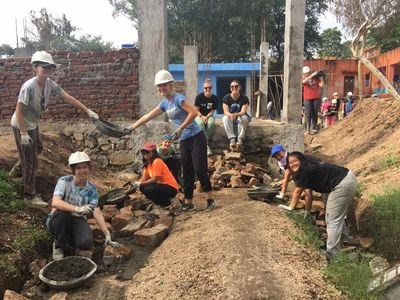Jasmine Knihniski of Preeceville traveled to India with a group of 21 Canadian volunteers to help build three classrooms for disadvantaged students in India. She started her journey on July 21 and returned home on August 8.
This is not Knihniski’s first volunteer tour; she had traveled to Africa last year doing similar work.
"I signed up for another trip after I returned from Africa," she said.
The group was responsible for building the foundations for three classrooms for a new school in Rajasthan, India. They enjoyed working side-by-side and learning the cultures and religion of the local people. Knihniski learned how to walk with a jug of water on top of her head and had the opportunity to wear traditional clothing.
"The people here are very modest which is reflected in their culture," said Knihniski. "We had the opportunity to cook with the local women and we made chipati which is a flatbread. The food for the most part was pretty spicy," she said.
The main diet consisted of rice, nan bread, chicken, lentils, vegetables and fruit. On the group's last day the students were treated to a special ceremony and meal that featured lamb.
The group was also exposed to the arts in India. The students had the opportunity to learn to paint a picture of an elephant, camel or horse. They were also taught how to dance, tie dye a piece of cloth that they took home and how to shop with rupees in the local market.
"The poverty is extreme in India but a big thing is education. Children are eager to learn. Girls can attend school from Grade1 to Grade 12 free but boys can only attend school to Grade 9 for free. If the boys want to continue their education they have to pay for it. Arranged marriages are a huge part of their culture," said Knihniski.
While in India, Knihniski toured a sacred catfish temple and got to feed them. The group she traveled with also went on nature walks encountering the many cows that roam freely in India. The cows are said to be sacred in Indian culture.
"Some of the things that really stood out for me were that we shouldn't take for granted the education we received here, and water is a huge issue for them. The well water is poor and nobody should have to be exposed to unsafe water.
“I have signed up with a fellow group member and friend,William Thao, a high school student from Wisconsin, USA, to establish an active campaign to raise funds for 10 filtered jugs for the school we helped to build," she said..
During their stay in the community of Antri, they learned about the five pillars of villages, education, water, health, food, and opportunity. Each pillar holds importance in breaking the world’s poverty cycle.
"While observing the living conditions in Antri, Will and I noticed the extreme lack of sanitation in the community wells. Approximately 21 per cent of communicable diseases in India are related to unsafe water. This was heartbreaking to us because back home in our more fortunate countries we take clean water for granted. This is why we have decided to create this campaign to mainly support the water pillar but it also overlaps into the health and education pillars as water is a basic necessity to keep our bodies healthy, as well as our minds sharp," she said.
Research from Water Tech shows that students retain more information at a quicker rate and stay focused for longer durations of time when hydrated, she said. Water Tech’s study found that drinking water improves brain function by up to 15 per cent.
"Will and I are raising money through donations and multiple fundraisers (bake sales, raffle sales, garage sales, etc.) to provide each classroom at the school in Antri with its own LifeStraw Community jug. Each jug costs $329.99 USD and our end goal is to be able to purchase 10.
These water purifiers filter out a minimum of 99.9999 per cent of bacteria, 99.999 per cent of viruses, and 99.99 per cent of protozoan cysts for 70 000-100 000 litres of dirty water, she said. Another huge benefit to working with LifeStraw is that for every product purchased, a child in a developing country will receive safe drinking water for a whole school year.
“That means double the children we all will be supporting and double the impact in the world.
“It is our hope that the children of Antri will have the opportunity to have healthy systems to keep them focused in their studies.
“It was truly amazing to see firsthand the value of education in the community and the pure eagerness to learn and attend classes.
“Will and I would also love to accompany the purchased water jugs to India to see our project followed through.”
Knihniski is currently a Grade 12 student in the Preeceville School and would like to take another trip overseas on a medical tour as she plans to become a doctor.




